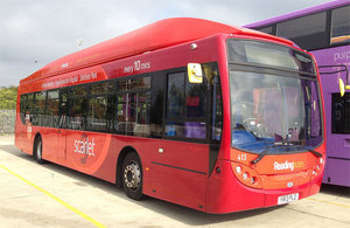Buying exclusively low carbon emission buses (LCEBs) by 2020 across Great Britain could achieve emission savings equivalent to taking 92,000 cars off the road and £248.5m a year in wider social benefits, a new report says.
According to a new report by the Low Carbon Vehicle Partnership (LowCVP), commissioned by sustainable travel group Greener Journeys, a new generation of clean buses is now saving 55,000 tonnes of greenhouse gas emissions per year and delivering £8m in health and environmental benefits.

A (red) low emissions bus
The report A Green Bus for Every Journey, says there are 3,760 certified LCEBs currently operating in towns and cities across England, Scotland and Wales, including 40% of new buses sold last year.
It says that if this proportion were to reach 100% of all new buses by 2020 in England, Scotland and Wales, annual savings could reach 432,000 tonnes of methane, carbon dioxide and nitrous oxide emissions – the equivalent of taking 92,000 cars off the road – and £248.5m in reduced health and environmental costs.
According to the report, government funding and policy, including the current Low Emission Bus Grant, have been critical in ‘kick-starting’ this market for low carbon emission buses.
Andy Eastlake, managing director of the LowCVP said: ‘The UK’s bus sector has made great progress in introducing low emission, efficient technologies over the last decade. This has been in large part due to the support of government and the commitment of industry and other stakeholders to work together and drive change.
‘This support and commitment needs to continue if the sector is to make a necessary contribution to cutting CO2 emissions, as well as to the increasingly urgent task of reducing pollution in our most badly affected towns and cities at least sufficient to meet 2020 air quality targets.’
The report argues that the ‘rich variety of green buses now available’, including hybrid, plug-in hybrid, electric, electrified ancillary, hydrogen fuel cell and biomethane models, ‘is allowing operators across the country to find the most tailored option for their network’.
It claims National Express’s fleet of 18 hybrid buses in Birmingham ‘is so popular that passengers sometimes complain when conventional models arrive at their bus stop’.
However, it also points to a significant improvement in the level of nitrogen oxides emitted by new diesel engines, with the latest Euro VI models – representing over half of all new models bought in 2015 - delivering a 95% reduction compared against the previous Euro V models.
Register now for full access
Register just once to get unrestricted, real-time coverage of the issues and challenges facing UK transport and highways engineers.
Full website content includes the latest news, exclusive commentary from leading industry figures and detailed topical analysis of the highways, transportation, environment and place-shaping sectors.
Use the link below to register your details for full, free access.
Already a registered? Login